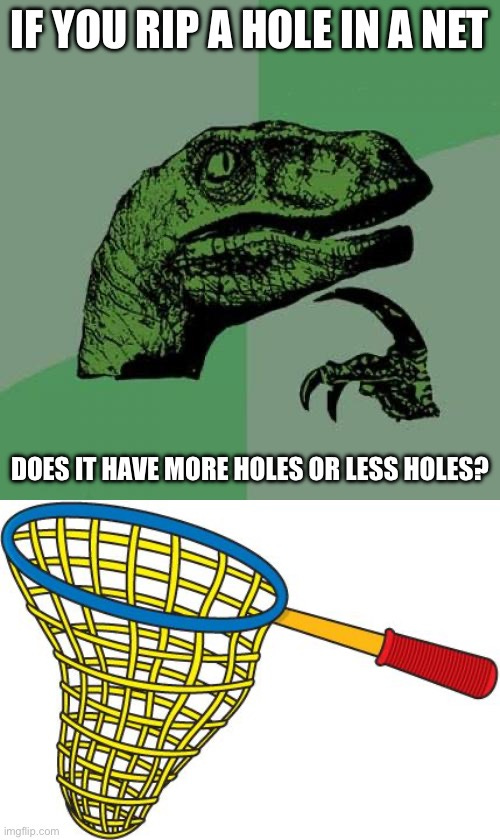Are holes real? Yes? No? Maybe so?
The puzzle over the status of holes is a case study in doing philosophy
Please like, share, comment, and subscribe. It helps grow the newsletter and podcast without a financial contribution on your part. Anything is very much appreciated. And thank you, as always, for reading and listening.
The aim of philosophy, abstractly formulated, is to understand how things in the broadest possible sense of the term hang together in the broadest possible sense of the term.
—Wilfrid Sellars
Most people know little, if anything, about philosophy. What is philosophy? What do philosophers do all day? Isn’t philosophy just subjective non-sense? These are some of the many questions I get from people—often not so explicit, but still—when I tell them that I am a professional philosopher. And that is understandable. I didn’t know anything about philosophy until I took my first philosophy class to satisfy a general education requirement—something I needed to graduate—and fell in love.
So, to better introduce the subject to others, I thought it fitting to explore a problem in metaphysics—the rigorous study of reality at its most basic and fundamental—to illustrate how philosophy is done.
Begin, then, with a basic question: are holes real? Or are they a convenient fiction?
So, for example, minds and persons are real—there is nothing fictional or imaginary about the existence of people, unless we are massively deceived or mistaken. In contrast, fictional characters do not, but we sometimes pretend that they do by, among other things, reacting in horror or laughter to fictional situations.
To have a hope of answering the questions above, we need to get clear on what the definition of a hole is, because without a shared definition, it would be hard to explore the reality (or fiction) of whatever the term referred to (or didn’t refer to). A quick check of the dictionary gives the definition of holes as a hollow place in a solid body or surface. Keeping in mind that dictionaries are not that great for conceptual clarity, but they are good as a starting place for how terms are used.
And in this case, the definition isn’t very helpful. For one thing, the term hollow is too similar to holes to be help. Luckily, though, we need not settle on a full definition of the term holes to get this philosophical case study off the ground. Consider that holes, by their very nature, require the absence of something. Of course, that is not all that holes are because just the absence of something would be insufficient for a hole. A better definition, though still flawed, is that a hole is an absence of material that is bounded by surrounding material.
The aim is not to exhaust the concept of holes but to identify a necessary condition of holes—something that holes must have by their very nature—to see if there are such things as holes. This might sound like semantic noodling, but it reveals something crucial about philosophy: we test our intuitions against formal commitments. We ask whether our ordinary ways of speaking and perceiving align with our best theories about what exists.
Against Holes
If a necessary condition of holes is that lack or absence of something, there cannot be holes. Why? Because the lack of absence of something is the opposite of something. It is weird, to say the least, to claim that the lack of something exists. How could that be? It would be like saying that SpongeBob SquarePants is yellow and porous—how could a fictional character, that by definition does not exist, have properties like color and permeability? Those are properties had by things that exist. It simply doesn’t look like something can have properties without existing. When we talk about SpongeBob, we engage in fictional discourse—that is, we talk and act as if SpongeBob has those properties even when there is no such entity as SpongeBob.
And yet, to be a hole is by necessity to lack something. Here is an argument.
Holes require the absence of something.
The absence of something is nothing.
Nothing cannot exist.
So, holes cannot exist.
It would seem, then, upon evaluating this argument that premises (1) and (3) are better secured than premise (2)—which is not to say that the premises are true.
The first premise looks relatively secure in the sense that holes do require the absence of something. A classic donut is defined, in part, by the absence of donut at the center—the hole of the donut. So, it would seem for something to qualify as a hole, there must be something about it that is lacking or missing. And if all of it is missing, then it is just an absence and not a hole. So, holes require the partial absence of something—whatever the hell that means.
And the same could be said for the third premise. Nothing is the complete absence of something. So, nothing is not something that could exist.
What about the second premise? It says that holes cannot exist because they require the absence of something, and the absence of something is nothing. And nothing cannot exist. Consider Swiss cheese. Is each hole a thing, or is it just the absence of cheese? If I move the cheese around the hole, does the hole move? What if I patch it up? Does that destroy the hole?
These rhetorical questions are meant to evoke intuitions that many of the answers one would give, if they thought holes existed, would be pretty weird.
For Holes
Are there reasons to think holes exist and aren’t mere fictions like SpongeBob and the color of his shorts? Of course!
There are some excellent reasons to think holes do exist. Begin with the thought that donuts couldn’t have holes if holes didn’t exist. How could donuts have the property of having a hole if holes do not exist. This would be like claiming there could be no such thing as unicorns, but then claim that unicorns explain the movement of the stars in the sky. Such commitments would obviously clash with each other.
Or take another argument. As a philosopher and a writer, I own a hole punch. It is a device that allows me to create holes in paper. However, how could one buy an object the creates holes in paper if there are no such things as holes? And if we claim that holes are a convenient fiction, are hole punchers also a convenient fiction? That is possible, of course, but it is incredible when described that way.
Here is an argument for the view:
One should only posit things that exist to the extent they explain things about the world (e.g., it wouldn't make sense, without good reason, to posit eight baseballs to explain one broken window).
Holes explains things in the world like holes in donuts and devices like hole punches that creates holes in paper.
So, holes are things that exist, despite their oddity.
The first premise is a widely held constraint in metaphysical theorizing. In other words, what we posit in our ontology—that is, what we take to exist—is constrained by what does explanatory work in our best theories. And holes seemingly explain any number of things like donut holes and hole punches. It could be, of course, that this too is a convenient fiction, but it looks easier to posit holes and acknowledge that they are metaphysically strange.
According to this take on holes, it looks like on the surface, we must be committed to the existence of holes, and framing holes as a convenient fiction doesn’t cut it—holes are too central to our commitments to be treated as mere convenient fictions.
So what do you think—are holes real, or are we just playing sophisticated pretend?






Very nice. I would have liked to see a section on anti-realist positions dealing with vague sentences like "more holes in the cheese than nuns in village" and the paraphrasing issue. I would also have liked to seen a ontic/ontological distinction being made. But that's just personal preference. Or treatment of everyone's favourite example, "if God creates a metal sheet with 100 atoms, and destroys one atom in the metal sheet, do we have 99 atoms and one hole - so our ontology hasn't changed since a hole has popped into existence, or is there only 99 atoms?"
Great post. I've actually been thinking about holes a lot recently, and more broadly about "nothing", and I think we might say that holes (and nothing) are real, but as something more like potentiality rather than actuality (in a roughly Aristotelian sense). It is like some Daoist texts that emphasise that it's the emptiness of a bowl, or the hub in a wheel, that makes it useful. It creates a space, and I think a space is essentially a "space of possibilities". Following that line of thinking, I prefer to reject the third premise, that "Nothing cannot exist". For example in the Book of Chuang Tzu it says,
>"There is something which exists, though it emerges from no roots, it returns through no opening. It exists but has no place; it survives yet has no beginning nor end. Though it emerges through no opening, there is something which tells us it is real. It is real but it has no permanent place: this tells us it is a dimension of space. It survives, but has no beginning nor end: this tells us it has dimensions of time. It is born, it dies, it emerges, it returns, though in its emergence and return there is no form to be seen. This is what we call the Heavenly Gate. The Heavenly Gate is non-existence, and all forms of life emerge from non-existence. That which exists cannot cause things to exist. They all arise from non-existence. Non-existence is the oneness of non-existence. This is the hidden knowledge of the sages."
It's very cool to see how the idea from western philosophy that "nothing comes from nothing" gets turned on its head by Chuang Tzu. I think with this idea of "nothing" as potentiality/space, we may be able to create a really cool synthesis of core Buddhist, Daoist, Aristotelian, and Platonist ideas. That's roughly what I've been working on recently.